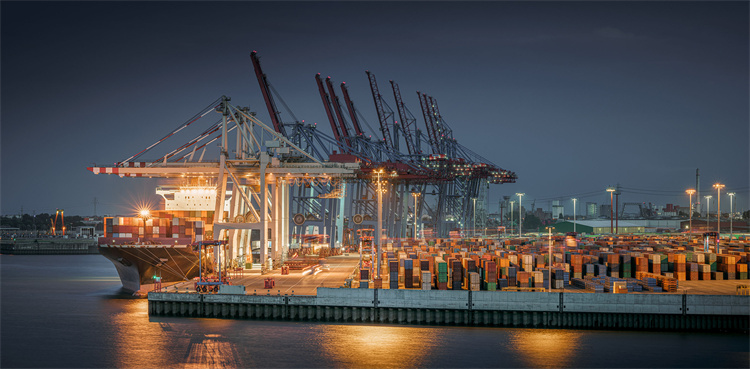Your Budget's Best Friend: Transportation Management Made Affordable

Efficient transportation management is a crucial element in optimizing costs and enhancing operational performance. The focus on affordability within transportation strategies can significantly impact businesses and individuals alike. By exploring key strategies, tools, and technologies, this blog aims to shed light on the benefits of cost-effective transportation management. From route optimization to vendor negotiations, uncovering these insights can pave the way for substantial savings and improved efficiency in logistics operations.
Benefits of Affordable Transportation Management

Cost Savings
In the realm of logistics, transportation management plays a pivotal role in achieving significant cost savings. By implementing efficient strategies and leveraging advanced technologies, businesses can optimize their freight costs and operational expenses. For instance, a manufacturer adopted a Transportation Management System (TMS) and conducted a transportation optimization study. The outcome revealed that minor tweaks to the transportation strategy could result in substantial annual savings. This underscores the importance of prioritizing affordable transportation management to drive financial efficiencies.
Reduced Freight Costs
Through meticulous route planning and load consolidation, companies can minimize their freight expenses.
Optimized multimodal transport selections and negotiated rates contribute to lowering overall shipping costs.
Lower Operational Costs
Implementing streamlined processes and automation tools leads to reduced operational expenditures.
Freight audits and pre-billing functionalities within TMS help in controlling operational costs effectively.
Improved Efficiency
Enhancing efficiency in transportation operations is another key benefit of prioritizing affordability. A case study highlighted an impressive 25% reduction in transportation costs by optimizing routes and negotiating favorable rates. This exemplifies how improved efficiency not only drives cost savings but also streamlines logistical processes for enhanced performance.
Streamlined Processes
Automation features within TMS streamline order processing, reducing manual errors and delays.
Real-time tracking capabilities ensure seamless monitoring of shipments, enhancing overall process efficiency.
Faster Delivery Times
Efficient route optimization shortens delivery timelines, meeting customer demands promptly.
Traffic avoidance strategies enable quicker transit times, improving the speed of goods delivery.
Enhanced Customer Satisfaction
Affordable transportation management directly impacts customer satisfaction levels by ensuring reliable deliveries and effective communication channels. By focusing on these aspects, businesses can build trust with their customers and establish long-lasting relationships based on quality service.
Reliable Deliveries
Timely deliveries through optimized transport routes instill confidence in customers regarding service reliability.
Consistent performance metrics track delivery success rates, guaranteeing dependable service quality.
Better Communication
Enhanced visibility into shipment status enables proactive communication with customers about delivery updates.
Predictive analysis tools anticipate potential delays, allowing for preemptive communication to manage expectations effectively.
Strategies for Cost-Effective Transportation Management
When optimizing transportation management for cost-effectiveness, businesses can explore various strategies to enhance operational efficiency and reduce expenses. One key approach is Route Optimization, which involves finding the Shortest Path and implementing Traffic Avoidance techniques to streamline delivery routes and minimize transit times.
By selecting the most direct routes, companies can reduce fuel consumption and transportation costs significantly.
Avoiding congested areas and peak traffic hours ensures timely deliveries and enhances overall operational efficiency.
Another valuable strategy is Load Consolidation, where businesses aim to maximize truck capacity by utilizing Full Truckloads effectively and considering Shared Shipments to optimize delivery schedules.
Fully loading trucks reduces the number of trips required, leading to lower transportation expenses.
Sharing shipments with other businesses allows for cost-sharing opportunities and efficient use of transport resources.
Lastly, engaging in effective Vendor Negotiations plays a crucial role in securing competitive pricing and long-term partnerships. Through practices like Competitive Bidding and establishing Long-term Contracts, companies can ensure cost-effective transportation services while maintaining service quality.
Competitive bidding encourages carriers to offer their best rates, resulting in cost savings for businesses.
Long-term contracts provide stability in pricing and service levels, fostering strong relationships with transportation partners.
By incorporating these strategic approaches into their transportation management processes, businesses can achieve significant cost savings while enhancing overall operational performance.
Tools and Technologies

Transportation Management Software
Transportation Management Software (TMS) is a vital tool that aids businesses in planning and executing the movement of goods efficiently. By utilizing TMS, companies can streamline their transport costs and enhance visibility into internal logistics processes. This platform enables real-time tracking of delivery vehicles, ensuring accurate shipments and easy access to essential documentation.
Automation
Implementing automation features within TMS simplifies order processing, reducing manual errors and enhancing operational efficiency.
Automated systems help in optimizing route planning, leading to cost savings through efficient resource utilization.
By automating repetitive tasks, businesses can focus on strategic decision-making and improving overall transportation management processes.
Real-time Tracking
Real-time tracking capabilities provided by TMS allow for seamless monitoring of shipment statuses throughout the delivery process.
Tracking delivery vehicles in real-time ensures timely deliveries and enables proactive decision-making to address any potential delays.
Enhanced visibility into shipment locations enhances customer satisfaction by providing accurate delivery estimates and updates.
Data Analytics
Data analytics plays a crucial role in leveraging insights from transportation operations to drive informed decision-making. By utilizing predictive analysis tools within TMS, businesses can anticipate trends and optimize transport strategies for improved efficiency.
Predictive Analysis
Predictive analysis tools help in forecasting demand patterns, enabling businesses to proactively adjust their transportation plans.
Anticipating future requirements based on historical data allows for better resource allocation and cost-effective transport solutions.
By analyzing past performance metrics, companies can identify areas for improvement and implement targeted strategies to enhance operational effectiveness.
Performance Metrics
Monitoring performance metrics through data analytics provides valuable insights into the efficiency of transportation operations.
Measuring key performance indicators such as on-time deliveries and cost per mile helps in evaluating the success of transport strategies.
Utilizing performance metrics allows businesses to track progress towards operational goals and continuously optimize their transportation management processes.
Third-Party Logistics (3PL)
Outsourcing transportation needs to Third-Party Logistics (3PL) providers offers various benefits for businesses looking to enhance their supply chain capabilities. These partners provide cost-effective solutions that streamline transport operations while ensuring high service levels.
Outsourcing Benefits
Partnering with 3PL providers reduces the burden on internal resources, allowing companies to focus on core business activities.
Outsourcing transportation management tasks to experts in the field results in optimized processes and improved operational efficiencies.
Leveraging the expertise of 3PL providers enhances flexibility in managing fluctuating transport demands without compromising service quality.
Cost-Effective Solutions
3PL providers offer scalable solutions tailored to meet specific business requirements while maintaining cost-effectiveness.
By outsourcing transport functions, companies can benefit from shared resources and economies of scale, leading to reduced overall transportation costs.
Collaborating with 3PL partners enables businesses to access advanced technologies and industry best practices for enhanced supply chain performance.
Outsourcing transportation needs can revolutionize businesses by reducing costs and boosting profits. Investing in a Transport Management System not only streamlines operations but also leads to significant cost savings. Enhancing public transport accessibility has far-reaching benefits, improving mobility and quality of life. Optimized routes and negotiated rates can result in substantial cost reductions, as evidenced by a 25% decrease in transportation costs. Automating transportation processes through a TMS minimizes resource requirements, making operations more efficient and cost-effective. Embracing these strategies ensures affordable transportation management for sustainable business growth.
See Also
Revolutionizing Efficiency: JUSDA's Logistics Optimization
Exploring the Future: Breakthroughs in Logistics Technology
A Comprehensive Look: The Future of LTL Freight
